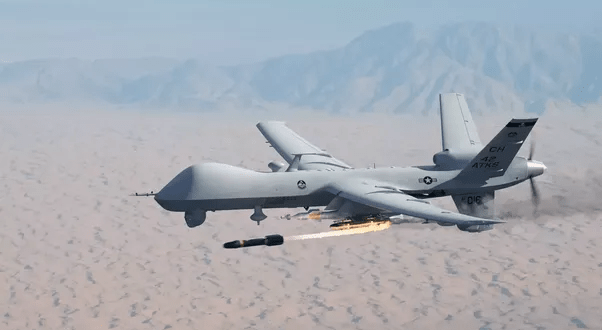www.aljazeerah.info
News, March 2020
Archives
Mission & Name
Conflict Terminology
Editorials
Gaza Holocaust
Gulf War
Isdood
Islam
News
News Photos
Opinion Editorials
US Foreign Policy (Dr. El-Najjar's Articles)
www.aljazeerah.info
|
Editorial Note: The following news reports are summaries from original sources. They may also include corrections of Arabic names and political terminology. Comments are in parentheses. |
9 Shabab Fighters Killed in US Drone Strikes, Reprots of Civilian Casualties, Clerics Call for Withdrawal of Kenyan Troops from Somalia
March 11, 2020
 |
 |
| Shaikh Juma Ngao | US drone |
US airstrikes kill Al-Shabaab members in Somalia
Shabelle.net, March 11, 2020
The US Africa Command (Africom) on Tuesday conducted an airstrike in coordination with the Somali troops that killed five Al-Shabaab fighters in Janale, southern Somalia, a day after another US airstrike killed four other militants in the same region.
In coordination with the Federal Government of Somalia, U.S Africa Command conducted an airstrike targeting Al-Shabaab in the vicinity of Janaale, Somalia on March 10, Africom said in a statement.
Africom, however, said they were investigating reports that the latest airstrike killed civilians.
“While we currently assess that the airstrike injured no civilians, we are aware of social media reports alleging civilian casualties resulting from this airstrike,” Africom said.
The US has ramped up airstrikes against Al-Shabaab, carrying out 26 strikes since the year started.
Withdraw KDF from Somalia, Muslim clerics urge
Shabelle.net, March 9, 2020
Muslim clerics have called upon the government to rethink its strategy and withdraw the Kenya Defence Forces (KDF) from neighbouring Somalia.
Speaking to the Nation, Kenya Muslims National Advisory Council (Kemnac) chairman Shaikh Juma Ngao said Kenya should respect the Somali government and allow it to deal with its issues.
“The ongoing tension between the two governments is affecting our brothers in the North-Eastern region. They (government) should rethink and bring our soldiers back home,” said Sheikh Ngao.
He further urged the government to protect its own people instead of exposing them to danger.
“If they are worried about Al-Shabab threats, then they should place the military on our borders, not inside neighbouring countries. Let them come and deal with the ones in Boni forest first,” he said.
Khalid Abdi, a Muslim cleric, also commented on the regional crisis.
“What is going on currently between the two governments is directly affecting the residents …The government should stop lying to us and resolve the matter. If it is a withdrawal of KDF, then they should undertake to do so,” said Mr Abdi.
Another Muslim cleric, Hashim Gedi, placed the blame for the crisis in North-Eastern squarely on the government.
“Our brothers are moving away from their own homes due to insecurity. I thought we are all patriots of this country, how can the government cause insecurity to its own people?” he asked.
“We all saw what happened in Mandera. Our children are out of school after they transferred all the teachers. Most classrooms in the region are now empty” Mr Gedi added.
“They are saying they are protecting Kenyans. But all we are seeing is the opposite of that.”
The comments from the clerics come as tension in Mandera town entered its second week after two Somali military camps clashed in the neighbouring town of Bula Hawa, the effects of which spilt over into Kenyan soil.
Somali President Mohamed Farmaajo is expected to meet President Uhuru Kenyatta at a date that is yet to be announced.
This follows a meeting between Mr Farmaajo and Interior CS Fred Matiang’i’s delegation where he presented an invitation from Mr Kenyatta.
AU calls on Somalia, Kenya to resolve their dispute amicably
Shabelle.net, March 7, 2020
The African Union has called on Kenya and Somalia to resolve their disputes amicably and urged restraint following close to a month-long row.
The AU Commission chairperson Fousa Mahamat in a statement Saturday urged the two countries to exercise restraint and give room for dialogue.
“The Chairperson of the Commission appeals to all stakeholders to exercise calm and utmost restraint, and encourages the two countries to resolve their differences through dialogue,” the statement read in part.
Mahamat’s remarks come amid tension in the border town of Mandera despite talks between Presidents Mohamed Farmaajo and Uhuru Kenyatta Wednesday.
Mandera Governor Ali Roba warned of escalating tension in the border town Friday noting Jubbaland soldiers were still roaming freely in the town.
A statement released by Villa Somalia Thursday noted the leaders of the two countries had spoken on phone Wednesday night and resolved to handle the border issues. It added the leaders agreed to form a joint commission to address the disputes.
Both Kenya and Somalia have traded accusations in the last two weeks. Somalia pointed fingers at Kenya over what it termed as intrusion and encroachment but Kenya dismissed the claims and later warned Somalia of ‘provocation’.
US Strikes in Somalia Nearly on Par with Strikes in Iraq, Syria
Shabelle.net, March 10, 2020
The pace of U.S. military strikes against al-Shabab in Somalia this year is nearly on par with the number of strikes against Islamic State in Iraq and Syria.
The U.S. has carried out 25 strikes against al-Shabab to date in 2020, including one Monday in the vicinity of Janaale, Somalia, that U.S. Africa Command (AFRICOM) said killed four terrorists.
Data released to VOA by a U.S. defense official show the U.S. carried out 29 airstrikes against Islamic State in Iraq and Syria from January 1 to March 1, the latest date in which strike data was available. A full strike report from Operation Inherent Resolve is expected later this week.
Strikes in Iraq and Syria have significantly tapered off since the territorial defeat of the so-called Islamic State caliphate last March.
In 2019, there were more than 2,000 airstrikes in Iraq and Syria, with at least 1,600 of those carried out in the first couple of months. U.S. Central Command has decreased troop numbers in Syria, where thousands of IS fighters are estimated to remain, but increased troop numbers elsewhere in the Middle East in an effort to counter the threat of Iran.
Meanwhile, AFRICOM conducted a record 63 strikes in Somalia last year. Most were against al-Qaida affiliate al-Shabab, which has an estimated 6,000 militants in Somalia, with a handful of strikes against Islamic State. There were 47 U.S. military strikes in Somalia in 2018.
“Airstrikes are preventative measures to ensure al-Shabab does not increase in size and strength,” AFRICOM spokesman Maj. Karl Weiss told VOA on Monday. “That said, airstrikes and kinetic operations are not the command’s primary effort in Somalia; our core activity is the training of Somali security forces.”
Despite the ramped up strike numbers in Somalia, Secretary of Defense Mark Esper has appeared averse to adding more U.S. troops to Africa, where Islamic extremists have plagued the continent from Somalia to the Sahel.
The Pentagon is in the middle of a review of AFRICOM that could reduce the number of U.S. troops on the continent. The first troop change in Africa under Esper’s leadership withdrew conventional troops and replaced them with specialized military trainers.
Esper has said the move would leave “roughly the same number of troops on the continent,” while giving U.S. commanders the capability to bolster partner forces.
Members of Congress have pushed back against any potential troop cuts, saying a decrease could provide an opening for strategic competitors Russia and China. Republican Senators Lindsey Graham and Jim Inhofe, the chairman of the Senate Armed Services Committee, have even called for an increase in the number of U.S. troops deployed to Africa.
Esper is trying to follow a shift started by his predecessor, Jim Mattis, away from counterterrorism toward strategic competition with China and Russia. During Mattis’ time as defense secretary, the U.S. pulled 100 to 200 troops from West Africa and was preparing for further cuts.
Defense officials said extremist groups in West Africa did not appear to pose a threat to the U.S. homeland, but they have since continued to pummel U.S. allies, especially in countries like Burkina Faso. A top general in U.S. Africa Command admitted to VOA at the time of the troop pullout that the U.S. and its allies were “not winning” the counterterror war for the Sahel.
https://www.radioshabelle.com/us-strikes-in-somalia-nearly-on-par-with-strikes-in-iraq-syria/
***
Share the link of this article with your facebook friendsFair Use Notice
This site contains copyrighted material the
use of which has not always been specifically authorized by the copyright
owner. We are making such material available in our efforts to advance
understanding of environmental, political, human rights, economic,
democracy, scientific, and social justice issues, etc. We believe this
constitutes a 'fair use' of any such copyrighted material as provided for
in section 107 of the US Copyright Law. In accordance with Title 17 U.S.C.
Section 107, the material on this site is
distributed without profit to those
who have expressed a prior interest in receiving the included information
for research and educational purposes. For more information go to: http://www.law.cornell.edu/uscode/17/107.shtml.
If you wish to use copyrighted material from this site for purposes of
your own that go beyond 'fair use', you must obtain permission from the
copyright owner.
|
|
|
|
||
|
||||||


